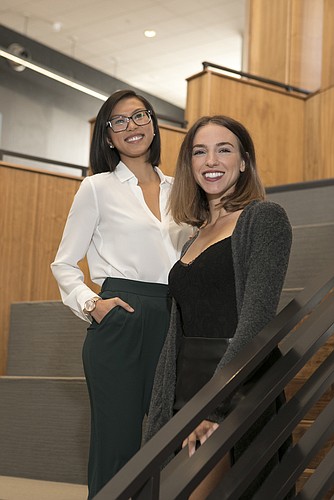- November 26, 2024
-
-
Loading

Loading

Lauren Wright and Tram Pham aren’t mothers.
But in The Natural Nipple, a startup that aims to improve the way newborn babies are fed, they might be the next-best thing: whip-smart nurse practitioners.
They are also rookie businesswomen, using passion and guile to get their product from the "people thinks it's an awesome idea" stage to multimillion-dollar sales.
“I’m in a lot of personal debt and compromising my lifestyle right now because I have faith in where this is going to go. I’m giving it everything I have.” Lauren Wright, CEO of The Natural Nipple
Wright, 28, is the CEO. She’s also pursuing a Ph.D. in psychoneuroimmunology at the University of South Florida and expects to graduate in spring 2019.
In that capacity, she’s found that the health and development of infants can greatly benefit from extended consumption of mothers’ breast milk. Yet, in tracking a well-known issue, she's also found that many bottles on the market fail to deliver a nipple shape and flow rate that can match those of babies’ moms, resulting in a phenomenon called “nipple confusion.” That, in turn, can make it difficult for babies to properly “latch” onto a nipple, leading to serious problems like anxiety and depression in moms and malnutrition in infants, particularly preemies.
Wright saw a potentially lucrative opportunity to prevent such problems. Along with Pham, 25, the company’s COO who works at Tampa General Hospital and is studying at USF to be a doctorally trained nurse practitioner, she created a collection of baby bottle prototypes with a variety of nipple shapes and sizes. The products recently won first place and $10,000 in the Florida Blue Statewide Heath Care Innovation Pitch Competition in Orlando.
Neither Wright nor Pham boasts a strong background in business — but that’s not stopping them. Despite working and being in school full time, they’re in discussions with potential investors and customers, such as hospital supply companies, proving the power of an idea and a willingness to sacrifice can take you far in business. The duo seeks an initial investment of $250,000.
“There was nothing else like our product at the pitch competition,” says Pham.
Wright adds, “Prolonging breastfeeding, just by six months, can bring down so many aggregated medical costs associated with autoimmune diseases and neurological and developmental conditions, specifically ADHD and diabetes.”
Wright and Tram are living off academic loans and stipends while in startup phase. “I’m in a lot of personal debt and compromising my lifestyle right now because I have faith in where this is going to go,” Wright says. “I’m giving it everything I have.”
The bottles will likely carry a suggested retail price of $24.99, Wright says, but that could change. At that price point, and based on projected sales of 30,000 units in the company’s second year, she estimates The Natural Nipple could surpass $6.2 million in revenue.
“We’re confident,” Pham adds. “If we can scale up by 30% every year, our lowest possible profit margin will be 67%.”
The Natural Nipple is headquartered at the University of Tampa’s Lowth Entrepreneurship Center Spartan Incubator program, where Wright and Pham have been able to enlist the help of student interns who work on marketing and advertising. They plan to focus on web and social media marketing at first, until they can hire a sales staff to engage potential retail partners such as Publix and CVS.
Florida Blue isn’t the startup’s only champion. Wright and Pham have assembled an advisory board, and the National Science Foundation awarded the pair a $53,000 customer discovery grant. Those funds allowed Wright to conduct an extensive survey of more than 300 new mothers who could benefit from the product.
“We want to see if maybe we are undervaluing this product,” says Wright. “If it really can reduce latching problems, maybe moms would pay more than $24.99.”
The NSF and Florida Blue backing, Wright adds, means, “It’s not like, ‘Hey, I think this works.’ It shows that this is a solution.”
Such a solution could be a godsend for working moms. “Some homes have the reverse problem, where the baby will only latch onto mom’s breast and won’t take a bottle when she has to go to work,” Tram explains. “But if we can match the mom’s breast with our bottle, then they’ll have an easier time with that transition. So it works both ways.”
Thanks to her customer research, Wright says she has uncovered another potentially lucrative market for products carrying The Natural Nipple design: dads.
“Guys are excited about this, as well,” she says, “because they’re like, ‘You don’t know how many nights I’ve stayed up wishing my wife could breastfeed the baby, because [the baby] wouldn’t take the bottle.”